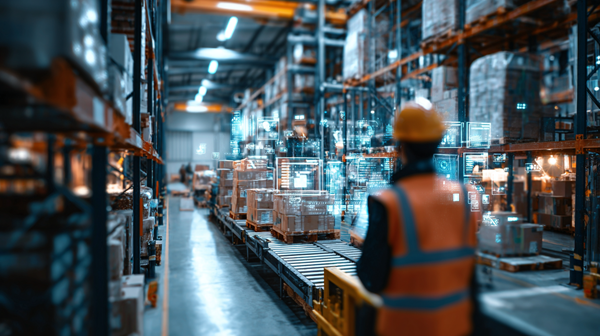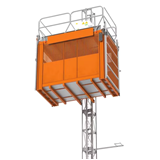Discover how AI is reshaping manufacturing, construction, and logistics in Australia. Learn about industry-specific applications, real ROI data, and local government funding programs to support your transformation.
Key takeaways:
- 78% of Australian manufacturing leaders now view AI as part of their overall digital strategy, reflecting widespread strategic alignment even if full-scale deployments are still underway
- 40% of Australian small and medium-sized enterprises were actively adopting AI by Q4 2024, a 5% increase on the previous quarter
- Construction projects using AI-driven management tools can reduce delays by up to 30% and cut project overspend by around 20%.
- AI-powered safety monitoring has delivered up to a 30% reduction in workplace accidents on pilot sites, thanks to real-time hazard detection and automated alerts.
- AI-driven route optimisation systems significantly reduce delivery times and fuel consumption in logistics operations.
- Predictive maintenance powered by AI can slash unplanned downtime by 20–40%, extending asset lifespans and saving millions in emergency repairs
Introduction
Artificial intelligence (AI) is no longer just a buzzword — it’s a transformative force reshaping how industries operate across Australia. Particularly in manufacturing, construction, and logistics, AI is delivering smarter, safer, and more efficient outcomes that directly impact your business’s bottom line. From automating repetitive tasks to predicting equipment failures before they happen, AI technologies are enabling companies to meet increasing demand, reduce waste, and enhance worker safety in an evolving market landscape.
In this article, we’ll explore the key ways AI is revolutionising these three critical sectors, highlight specific Australian data and case studies, and offer insights into how your business can harness these advancements today.
AI in manufacturing: boosting efficiency and resilience
Manufacturing in Australia is embracing AI to address rising costs, supply chain disruptions, and competitive global markets. Key applications include:
- Predictive maintenance: AI-powered sensors and analytics predict equipment faults before they cause downtime. CSIRO reports predictive maintenance can reduce unplanned downtime by up to 40%, saving millions annually.
- Quality control automation: Machine vision systems detect defects at higher speeds and accuracy than human inspectors, improving product quality and reducing waste.
- Process optimisation: AI models analyse production data to optimise workflow, energy use, and inventory, enabling manufacturers to respond swiftly to market fluctuations.
- Workforce augmentation: Cobots (collaborative robots) assist human workers with repetitive or dangerous tasks, improving safety and productivity.
For example, an Australian automotive parts manufacturer reduced scrap rates by 18% and increased throughput by 12% within the first year of implementing AI-driven quality control systems
AI in construction: improving safety, planning and project delivery
Construction has traditionally lagged in technology adoption, but AI is quickly bridging this gap by helping your site become safer and more efficient:
- Site safety monitoring: AI-enabled cameras and drones monitor work zones in real-time, detecting hazards and alerting supervisors instantly, contributing to a reported 20% reduction in workplace incidents.
- Project management and scheduling: AI algorithms analyse historical data and current conditions to forecast delays, enabling proactive adjustments. Infrastructure Australia notes a 30% decrease in delays for projects using AI scheduling tools.
- Design optimisation: Generative design AI tools assist architects and engineers in creating cost-effective, sustainable structures by rapidly iterating thousands of design options.
- Equipment and resource management: AI tracks equipment usage and material consumption in real time, reducing waste and downtime.
Australian construction companies adopting AI tools have noted significant improvements in on-time project delivery and cost control, crucial for maintaining competitive bids in a tight market.
AI in logistics: Optimising supply chains and last-mile delivery
Australia’s vast geography makes efficient logistics vital. AI’s role in transforming the supply chain and delivery processes is becoming increasingly indispensable:
- Route optimisation: AI systems analyse traffic, weather, and delivery windows to plan the fastest, most fuel-efficient routes. This has cut fuel consumption by 15% in pilot programs by Australian freight firms (Australian Logistics Council, 2024).
- Inventory forecasting: Machine learning models predict demand with greater accuracy, helping businesses minimise overstock and stockouts, reducing holding costs.
- Autonomous vehicles and drones: While still in early stages, autonomous trucks and drone deliveries are being trialled in regional Australia to address last-mile delivery challenges.
- Real-time tracking and transparency: AI-powered platforms provide end-to-end visibility, improving customer satisfaction and reducing lost goods.
These AI advances help your logistics operations become more agile and sustainable, while navigating Australia’s unique terrain and dispersed population centres.
Government programs and funding support in Australia
Adopting AI doesn’t have to be an isolated investment — several Australian government programs are actively supporting businesses integrating AI and advanced technologies across key industries. If your business is ready to scale its digital transformation, these funding opportunities may be available to you:
Industry Growth Program (2024–25)
A national initiative offering advisory services and funding support for Australian SMEs investing in advanced technologies, including AI. Priority sectors include manufacturing and logistics.
- What’s available: Commercialisation advice and matched grant funding up to $5 million.
- Best for: Manufacturing and supply chain businesses developing or adopting AI-driven systems.
- Learn more: business.gov.au
Modern Manufacturing Initiative (MMI)
Targeted at scaling and transforming local manufacturing, this grant program supports capital investments that integrate advanced technologies like AI, robotics, and IoT.
- What’s available: Co-investment funding for major equipment and technology upgrades.
- Best for: Mid-to-large manufacturers looking to automate or optimise production.
- Learn more: industry.gov.au
CSIRO SME Connect – Innovate to Grow and AI Accelerator
CSIRO’s SME Connect program links small and medium businesses with research institutions to help them adopt emerging technologies, including AI.
- What’s available: Fully subsidised R&D support, with grants of up to $100,000 for collaborative AI projects.
- Best for: Early-stage or scaling businesses seeking low-risk entry to AI solutions.
- Learn more: csiro.au
AusIndustry’s AI Solutions Program
This federal program is designed to help Australian businesses trial and adopt AI in real-world environments, particularly in sectors with strong export potential.
- What’s available: Grant funding of up to $500,000 for proof-of-concept AI deployments.
- Best for: Logistics, construction, and manufacturing firms piloting scalable AI use cases.
- Learn more: business.gov.au
State-based programs
In addition to national support, several Australian states offer targeted AI and digital innovation funding:
- NSW AI Solutions Panel – Facilitates procurement of AI tech for infrastructure and public sector use.
- VIC Digital Jobs Program – Co-funds training and AI-related upskilling for workers.
- QLD Industry Tech Fund – Provides grants for regional businesses implementing AI and automation.
Challenges and considerations for Australian businesses
While AI presents huge opportunities, adopting it in manufacturing, construction, and logistics isn’t without hurdles:
- Data quality and integration: Nearly half (43%) of Australian companies report poor-quality or siloed data limits AI’s effectiveness.
- Skill shortages: There is a critical need for AI-literate staff and ongoing training to maximise technology benefits.
- Cost and complexity: Initial investment and integrating AI with legacy systems require careful planning and vendor selection.
- Regulatory and ethical considerations: Ensuring AI is used responsibly and complies with Australia’s emerging AI governance frameworks is vital.
Addressing these challenges will position your business to thrive in a rapidly evolving industrial landscape.
How to start leveraging AI in your business
To unlock AI’s full potential, consider these practical steps:
- Assess your current processes: Identify repetitive, error-prone, or high-cost activities AI could improve.
- Invest in data infrastructure: Clean, integrated data is the foundation for effective AI.
- Pilot small projects: Test AI solutions in manageable areas before scaling.
- Partner with experts: Collaborate with AI vendors, universities, or innovation hubs for guidance.
- Upskill your workforce: Train your staff in AI tools and data literacy.
- Stay informed on regulations: Ensure compliance with Australian AI ethics and safety standards.
- Give your team space to explore: Allocate time for staff to experiment with AI tools hands-on—sandboxing ideas fosters creativity and uncovers practical use cases.
Conclusion
AI is rapidly transforming manufacturing, construction, and logistics in Australia, driving efficiencies, safety, and sustainability gains that directly benefit your operations. By understanding where AI fits within your business and addressing adoption challenges head-on, you can future-proof your enterprise in a competitive global market.
Embrace AI today and position your business as a leader in Australia’s next industrial revolution.









